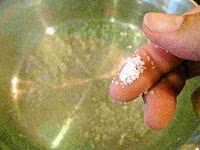<Ingredients>
Handful shungiku garland chrysanthemum flowers
Pinch salt (to blanch spinach and flowers, not in photo)
For ohitashi marinade
200 cc katsuo-kobu dashi
1 tbsp sake + mirin (equal parts)
1 tbsp usukuchi soy sauce
Pinch salt (not in photo)
<Directions>
1.
Microwave sake + mirin for 10 seconds to get rid of alcohol.
In a container, put dashi, sake + mirin, usukuchi soy sauce and salt, and mix well.
Set aside.
2.
Bring a full pot of water to boil, add pinch salt, and blanch shungiku flowers.
Shungiku flowers here are placed in a basket (colander), dipped in boiling water, and immediately transferred to ice water.
Once cool, remove from ice water.
3.
In the same boiling water, put spinach, stems first and then leaves.
When color brightens, transfer to ice water.
When cool, squeeze out extra water, and cut into 3-4cm length.
4.
Squeeze out extra water once again, put in ohitashi marinade, and soak for 10 minutes.
5.
In the meantime, remove shungiku flower petals, and set aside.
6.
When almost ready to serve (after marinating spinach for 7-8 minutes), put shungiku flower petals in ohitashi marinade.
<Notes>
- The ohitashi marinade above is for immediate serving. When spinach is marinated more than 10 minutes, it tastes too much like soy sauce. If planning to serve more than 15 minutes later, reduce the amount of usukuchi soy sauce to 2 tsp; if serving more than a hour later, reduce to 1 tsp. Regardless of how long spinach marinates, add shungiku flowers just before serving.
- Generally, only the leaves and stems of shungiku are used, and it is not considered to be shokuyogiku, or chrysanthemum grown only for its edible flowers. Shokuyogiku tastes less bitter, and the flowers are either yellow or purple. Some have long, curled (tubular) petals. Short, small petal types are often used to decorate sashimi dishes, while long petal types are often used in small dishes such as ohitashi, gomaae (blanched and dressed with sesame dressing), sunomono (blanched and dressed with sweetened vinegar) and tempura. Shokuyogiku is also added to dashi-based sauce (kikuka sauce) thickened with potato starch or kuzu.















No comments:
Post a Comment